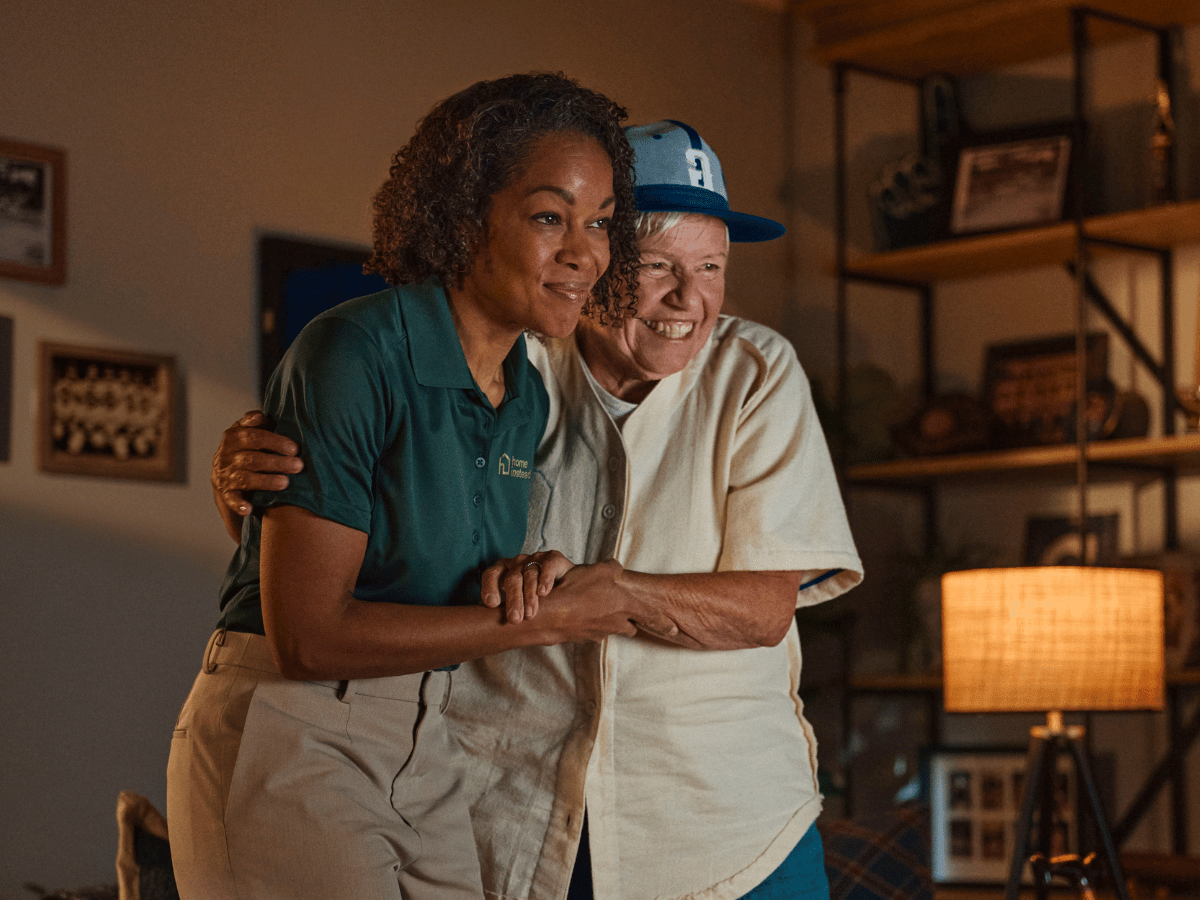
Help a Loved One with Dementia Feel Valued at Home
Supporting a loved one with dementia doesn’t require grand gestures—it’s often the smallest, most consistent moments that make the biggest difference. With the right approach, emotional connection, and trusted in-home care, family caregivers can help their loved ones feel secure, included, and appreciated every day.
This guidance is inspired by a heartfelt conversation on Caregiver Chats, where Home Instead gerontologist and caregiving advocate Dr. Lakelyn Eichenberger sat down with dementia care expert David Troxel, co-author of The Best Friends™ Approach to Dementia Care. Together, they explored how home-based care can foster dignity and meaning for people living with dementia.
Why Home Is So Important
Home is more than a location—it’s a lifeline for those with memory loss. Familiar surroundings, established routines, and treasured belongings provide comfort, reduce anxiety, and help maintain orientation. Aging in place allows many individuals with dementia to continue living in an environment where they feel most themselves.
David Troxel emphasized that staying at home supports not just physical safety, but emotional well-being, too. For many families, it’s where love and identity are strongest.
Easy Ways to Show You Care
Creating connection doesn’t have to be complicated. David recommends building “30-second activities” into the day—simple actions that invite involvement and affirm purpose:
- Arranging flowers or sorting buttons by color
- Watching a favorite TV show together
- Baking treats or helping set the table
- Asking for their opinion on clothing or music
These moments show respect and help your loved one feel included in everyday life.
The Role of Companionship
Loneliness is a hidden challenge among older adults, especially those with dementia. That’s why companionship is so important. A Home Instead Care Professional offers more than just practical support—they engage with your loved one as a trusted presence, sparking conversation, sharing hobbies, and bringing positive energy into the home.
What If They Resist Help?
It’s common for individuals with dementia to be hesitant about bringing someone new into the home. Dr. Lakelyn and David discussed ways to introduce care that feel safe and respectful:
- Frame it as temporary: “Let’s try this for two weeks.”
- Suggest it’s recommended by a doctor or therapist
- Make it about helping someone else: “This caregiver could really use the work—and we could use a hand.”
These strategies help ease the transition and reduce emotional resistance.
Caregiver Tip: Don’t Forget About You
Family caregivers often give their all—but nobody can provide care around the clock without support. Respite care allows you to take essential time for rest, errands, social connection, or simply breathing room. As Dr. Lakelyn notes, self-care isn’t selfish—it’s the foundation that keeps you going strong.
👉 Learn more about respite care
Questions to Ask When Considering Dementia Care
If you’re exploring in-home care, David Troxel suggests asking these key questions:
- Are your Care Professionals trained in dementia care?
- How do you personalize engagement based on my loved one’s interests?
- What do you do to build trust in the early stages of care?
- Can care services evolve as needs change?
👉 Discover Home Instead’s dementia care approach
Frequently Asked Questions
How can I help someone with dementia feel more involved at home?
Involve them in simple, familiar activities. Folding towels, listening to music, or even giving feedback on dinner plans can bring a sense of contribution.
Is it normal for someone with dementia to resist outside help?
Yes, and that’s okay. Framing help as a short-term trial or a way to support you—the caregiver—can often reduce pushback.
What kind of training do Home Instead Care Professionals have?
Home Instead Care Pros receive specialized dementia care training to ensure they can support your loved one with empathy, consistency, and skill.
Can care evolve as dementia progresses?
Absolutely. Home Instead’s services are designed to adapt as needs increase, from companionship to more complex memory care.
Want More Support?
Caregiver Chats is a podcast created just for you—family caregivers, professional care providers, and anyone supporting an aging loved one. Hosted by Dr. Lakelyn Eichenberger, each episode offers expert insights, emotional support, and real-world strategies to help you navigate the caregiving journey with confidence and compassion.
Whether we're talking about dementia care, burnout, end-of-life planning, or finding moments of joy in everyday care, this show is a trusted companion for every stage of caregiving.
🎧 Listen to the episode on dementia care at home
🔔 Subscribe on Apple Podcasts, Spotify, or your favorite platform
📬 Have questions or topic ideas? Email us at caregiverchats@homeinsteadinc.com
Looking for more helpful advice and encouragement?
👉 Explore additional caregiver tips and support tools


